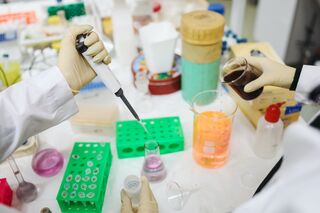Misophonia
An Update on Misophonia Research
What do the misophonia 23andMe genetic results really tell us?
Posted June 11, 2020

Many people ask if misophonia is genetic. There has been one association in terms of genes and misophonia which you may have read about: 23andMe researchers have identified one genetic marker associated with feeling rage at the sound of other people chewing. In addition to the Duke Quarterly Update this June (26), these genetic findings will be discussed. For those of you who cannot attend, here are some highlights.
This genetic marker is located near the TENM2 gene, which is involved in brain development. The genetic marker associated with this trait is just one piece of the puzzle, and that non-genetic factors also play a role.1
For centuries scientists, psychologists, philosophers, and those of us simply interested in human nature have struggled with the “nature versus nurture” debate. We all know that genes play a tremendous role in human nature and health and that attributing neurodevelopmental and neuropsychiatric conditions on constructs such as “bad mothering” was an ex post facto embarrassing mistake that was thankfully left behind with other retrospectively ill-founded ideas such as the Pet Rock.
While our understanding of nature versus nurture has advanced greatly, the concept of epigenetics (the study of how the environment influences gene expression) is still counterintuitive to most of us. Many of us were taught that ideas of “nature” and “nurture” were mutually exclusive, or dichotomous. That is, human nature is attributed to either nature or nurture, but not both.
For centuries, people placed human development, health, and disease processes primarily into one category or the other. For example, a disease or condition was either genetic (nature) or acquired (nurture). However, the field of epigenetics has revealed that it is not simply which genes we have that determine our health, personality, and so on, but how those genes interact with the environment also matters.
Certainly, this is not to suggest that “bad mothering [parenting]” has returned as a source of blame for genetic disorders. Instead, a better way to think about it is that the genes themselves have their own relationship with the outside world. The field of epigenetics suggests that if one is born with a particular gene or gene(s), the environment may interact to actually “turn on” or “turn off” those genes. Factors in the environment such as toxins and poor nutrition can affect when and how genes will express themselves.
However, as psychologist David S. Moore cautions, epigenetics is in the early stage of research. While it changes the view of genetic expression as being pre-determined and fixed, this does not mean that science provides us with ways to control health or personality outcomes through the environment. Beyond what most of us already know (a better environment free of toxins and stress enhances anyone’s health), the field of epigenetics has provided us with a way to manipulate the gene/environment relationship. In fact, there are factors in the environment that may affect gene expression (genes being turned on or off) that we don’t even know about yet.
Epigenetics has shifted scientific thinking in terms of how disorders are classified, for example. Often, the age of onset has been used to distinguish one disorder from another. However, epigenetics tells us that genes can be turned on and off, rendering “age” much less important.
Finally, epigenetics also brings into question the categorical differences psychiatry and medicines have used to describe “genetic disorders." Genes for many different disorders overlap. Do lifelong interacting gene/environmental factors determine these differences that for so many decades medical diagnostics have deemed so separate?
Related to misophonia, we hope to see research addressing these issues. However, the process is not as easy as searching for a single misophonia gene. Multiple genes may be involved and an epigenetic process must be considered.
Until research reveals the truth, it is particularly important for doctors and clinicians to make assumptions about if and how misophonia runs in the family. It is essential to let sufferers know that observations about genetic (or family history) are anecdotal.
To take part in the Duke Quarterly Research Update, which will also address genetics, please see Misophonia Education.


